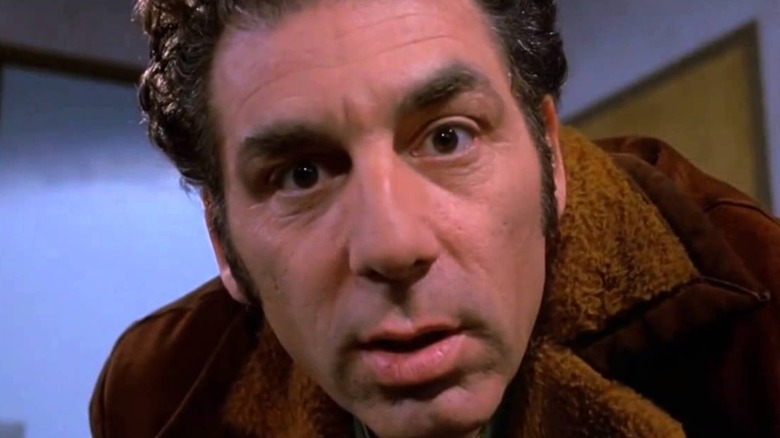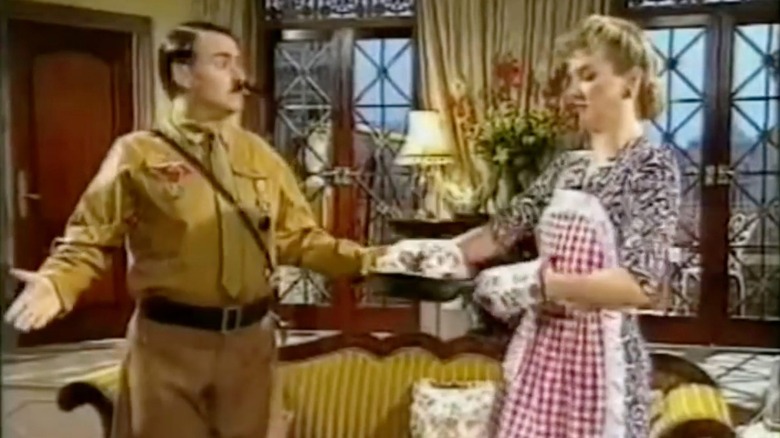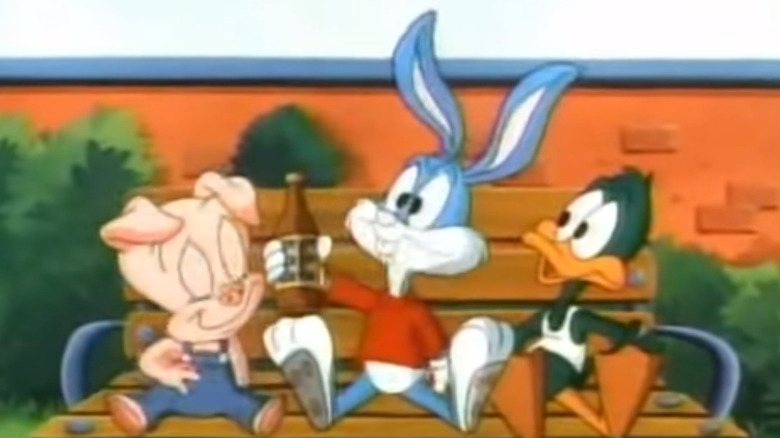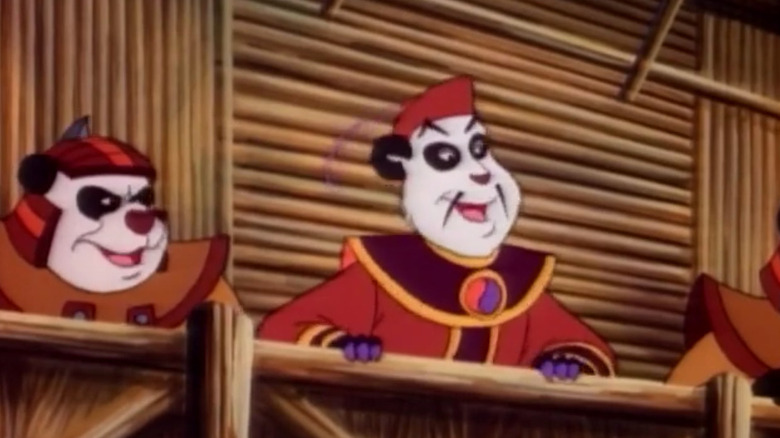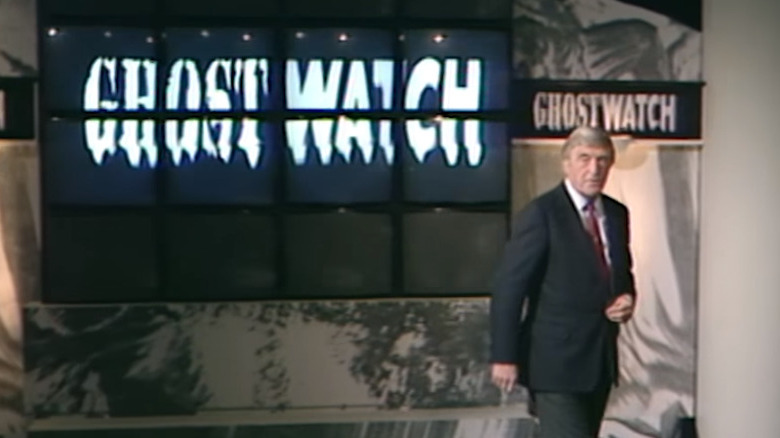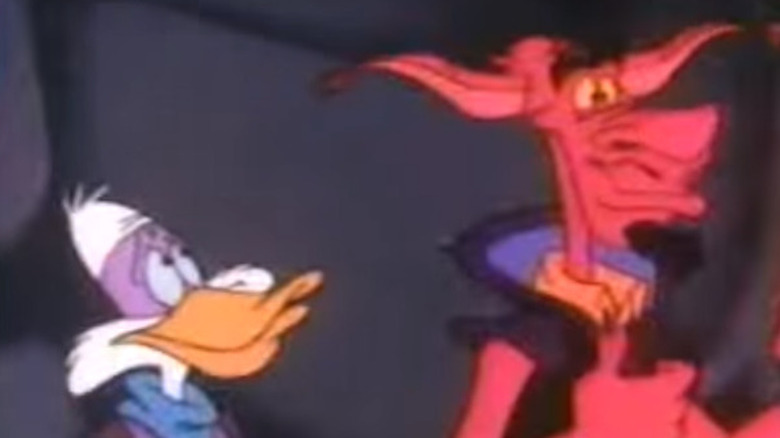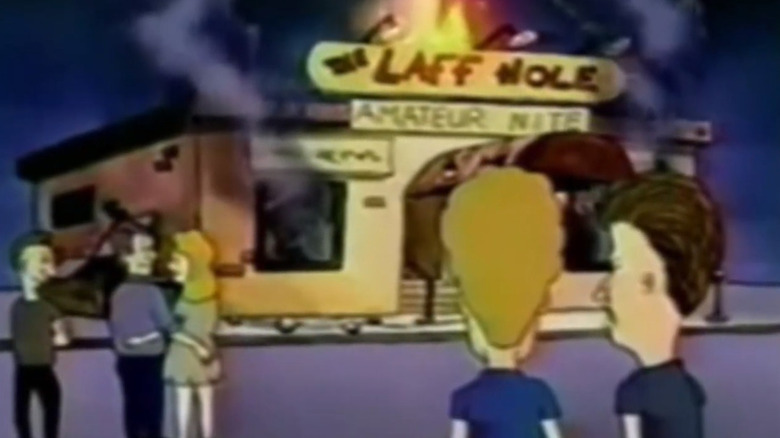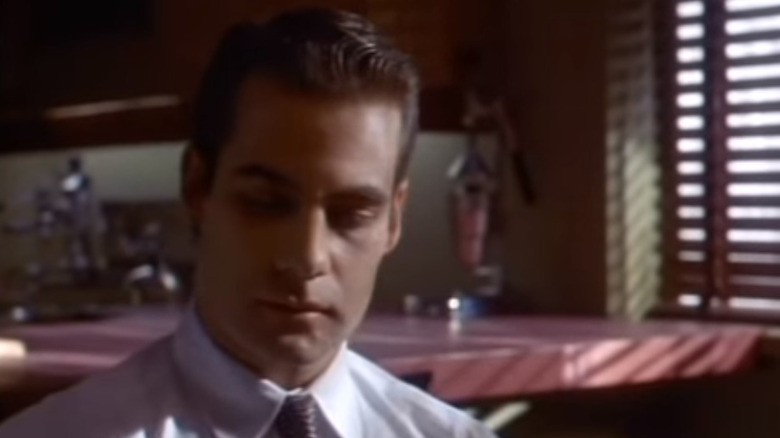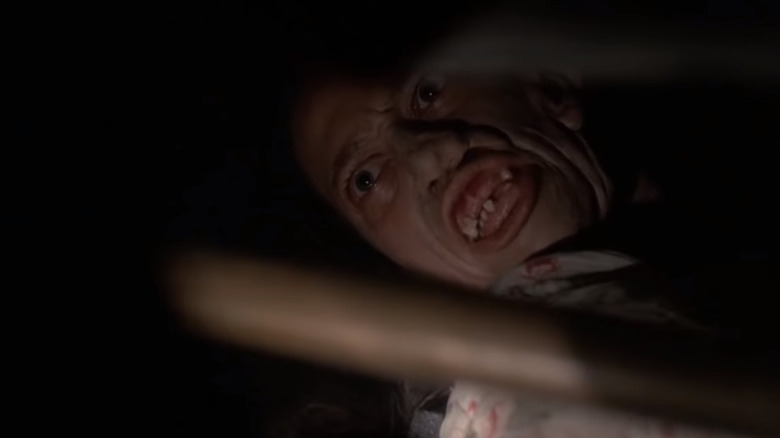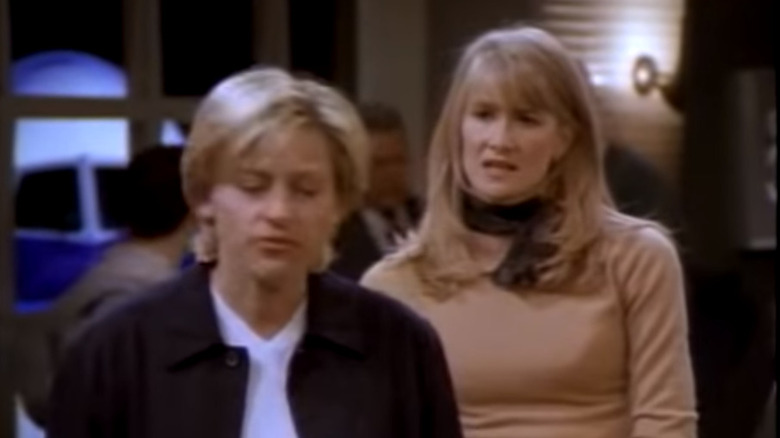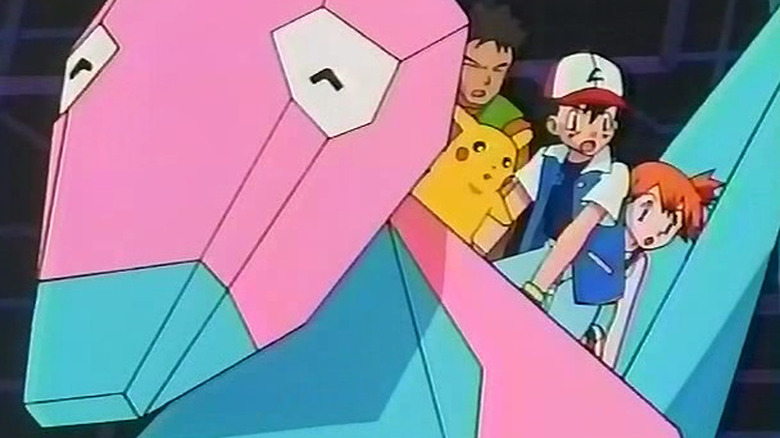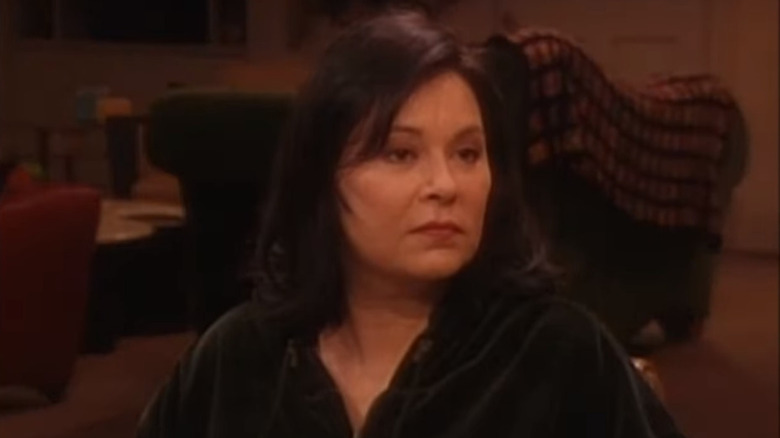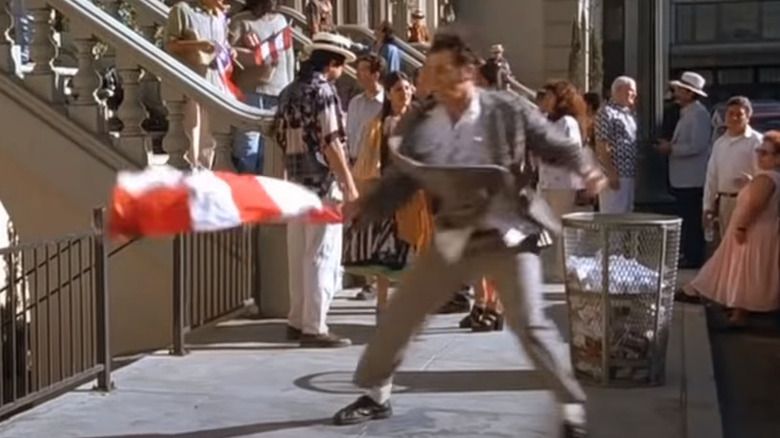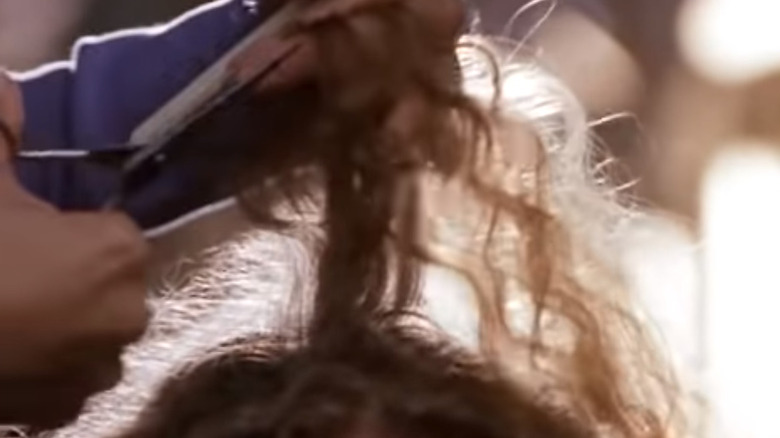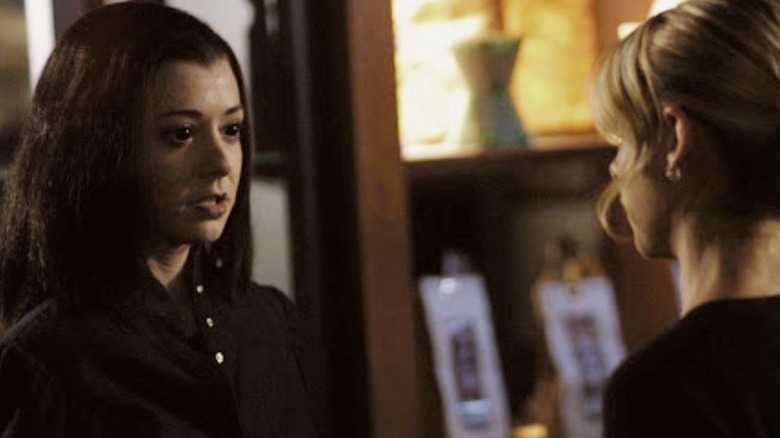Times '90s TV Shows Outraged Fans
As anyone who has ever been part of today's fandom communities can tell you, entertainment enthusiasts can be a rather passionate lot. Whether it's about casting choices, character moments, or how sensitive issues are handled, you can expect fans to raise their voices and make their displeasure known to the creators, the production companies, and even their fellow fans. And while people tend to look back at the past through rose-colored, nostalgia-framed glasses, the truth is that fan outrage isn't new at all.
Take the 1990s, for example. As a decade that, in many ways, continues to influence contemporary art and culture to this day, the era remains bold, bright, and fresh in the eyes and memories of many. Perhaps that's what makes it easy to overlook the numerous controversies that plagued TV shows that came from that time period. In some cases, the reasons behind the backlash were as clear as day; in others, they were absolute head-scratchers. Here are some examples of the most notable times when TV shows from the '90s outraged fans.
When a sitcom starring Adolf Hitler was canned after just one episode
One would think that creating a TV show has to begin with a bunch of suits sitting down and talking about whether a concept would or wouldn't work. Ideally, this should nip any potentially problematic ideas in the bud before they could go into production and burn some precious studio bucks.
Apparently, that wasn't the case with "Heil Honey I'm Home!" This British sitcom followed a fictionalized Adolf Hitler and Eva Braun as a quirky couple in a cornball 1950s-inspired setting. Their next-door neighbors were a Jewish couple called the Goldensteins, with whom they clashed (via BBC). A single episode aired in 1990 before a combination of behind-the-scenes disagreements, production woes, and protests from groups offended by the idea of trivializing the tyrant took it off the air completely.
In an interview with Entertainment Weekly, series creator Geoff Atkinson explained the thought process behind the show: He wanted to beat the bully by laughing at him. "If you have a monster like that, and everyone says, 'You can't make fun of him,' then we've made him even more [of] a monster. That's what fascists want, to keep people in fear of them, when surely we should be debunking and destroying them." You can watch the pilot of "perhaps the world's most tasteless situation comedy" on YouTube, in case you were curious.
When the Tiny Toons got drunk and died after crashing a stolen police car
Sometimes, even the most well-intentioned attempts at social awareness can backfire, especially when you attempt to do it in a children's cartoon. One major example is the 1991 "Tiny Toon Adventures" episode "Elephant Issues," whose satirical segment on the dangers of drunk driving caused it to be banned from reruns on FOX Kids.
In the episode's third short, "One Beer," Buster Bunny, Plucky Duck, and Hamton J. Pig immediately engage in some car-stealing shenanigans after drinking a single bottle of beer. As soon as they get intoxicated, they manage to carjack a police vehicle, looking worse for wear. The beloved characters end up driving off a cliff, seemingly killing themselves and ascending into Heaven as angels. The true punchline comes seconds later, when the camera pans to reveal the three characters alive and unscathed in a studio; the entire skit was a scripted gag to teach kids about the horrors of alcohol.
Despite its important message and clear self-awareness, it was taken off the air and rarely re-broadcast, allegedly due to backlash from parents. It did, however, make it into the third volume of the "Tiny Toon Adventures" DVD collection in 2013 (via TV Shows on DVD).
When TaleSpin stereotyped Asians and featured terrorists
The '90s Disney cartoon "TaleSpin" had an interesting concept, taking the animal characters from the 1967 animated classic "The Jungle Book," further anthropomorphizing them, and placing them in a city setting reminiscent of the 1930s. It focused on Baloo the Bear, who was reimagined as a cargo plane pilot, and followed his missions and misadventures laced with action, comedy, and family themes. For most of its run, "TaleSpin" enjoyed a smooth journey. However, there were at least two episodes in which the production encountered some turbulence, due to crucial story elements that just didn't fly with audiences and censors alike.
The first was the 1990 episode "Last Horizons," which IMDb describes as Baloo's search for a "city beyond the last horizon." That city turned out to be Panda-La, a mystical society of pandas under the command of a warmongering leader. Due to the strong undertones of unfavorable East Asian stereotyping, it was taken out of regular circulation, accidentally appearing every once in a while on Toon Disney.
The other infamous episode — initially meant to be the series finale — was "Flying Dupes," reportedly aired only twice. In the episode, Baloo was duped into delivering a time bomb to a high official's residence (via IMDb). Due to its terrorism-related themes, the Disney Channel removed it from circulation as well. "Last Horizons" and "Flying Dupes" proved to be so controversial, they're the only two "TaleSpin" episodes that are not available on Disney+.
When a BBC horror drama was so convincing, thousands thought it was real
Back in 1957, the BBC expertly pulled the wool over its viewers' eyes with a doozy of an April Fool's prank. With a spoof documentary, they managed to trick audiences into thinking that spaghetti actually grew on trees. This bit of fun led to the network receiving calls from hundreds of viewers interested in cultivating their own spaghetti bushes. Ultimately, it was a harmless bit of fun that became more successful than it should have been. 35 years later, on Halloween night, the network bamboozled a considerable chunk of its viewership once again — except this time, it had disastrous consequences.
Aired as part of its "Screen One" anthology, BBC's "Ghostwatch" was a made-for-TV horror film shot as a mock documentary. Over the course of one-and-a-half hours, viewers tuned in to a staged haunting-gone-wrong, masterfully crafted to look authentic. Unfortunately, due to unforeseen technical glitches, many viewers thought they were witnessing an actual evil spirit taking over the presenter.
According to Business & Arts, the network received 20,000 to 30,000 phone calls that night, causing further technical malfunctions and confusion. Later reports revealed at least half a dozen children suffered post-traumatic stress disorder from watching the show — and that an 18-year-old boy tragically took his own life five days after seeing the broadcast. The BBC issued a public apology, and distanced itself from the production for almost two decades.
When Darkwing Duck dabbled with Satanic themes
When viewers tune in to a children's cartoon, they usually have a set of expectations regarding its content: nothing crass, nothing controversial, and certainly nothing invoking the Devil. Perhaps that's why the "Darkwing Duck" episode "Hot Spells" reportedly caused quite a stir with parents, according to DuckTalks.
Initially aired in 1992 as the series' special Halloween episode, "Hot Spells" got into hot water because of its depiction of one of the lead characters, Darkwing Duck's young niece Gosalyn, making a deal with the King of Hell himself (going by the name "Beezlebub" in this toon). The episode showed this and the heavy consequences of the deal to emphasize that "there are no shortcuts on learning (and math is required in almost every profession)." Sadly, the angry parents who complained to ABC missed this lesson, focusing only on the Satanic themes and forcing the network to ban the episode from syndication. IMDb notes that this is the only "Darkwing Duck" episode that you won't find on GooglePlay, iTunes, or Disney+.
When Beavis and Butt-Head's stand-up routine (allegedly) had real-world consequences
Truth be told, no one really has high expectations concerning morality and ethics when it comes to "Beavis and Butt-Head." After all, the MTV animated show influenced an entire generation with its crass and irreverent brand of humor. It's no surprise that a number of episodes have been edited or even outright banned, as compiled by LA Weekly. However, there's one infamous episode that was completely removed from circulation, due to a real-world tragedy it allegedly inspired.
According to the New York Times, a five-year-old boy from Ohio who saw the 1993 episode "Comedians" set the family's mobile home on fire a month later, leading to the death of his younger sister. In the interview, the boy's mother claimed that a sequence in the episode (likely the ending, in which the titular characters burned down the comedy club) promoted the idea that playing with fire was fun.
Interestingly, this wasn't the first time the show was associated with a real-world fire in Ohio. The same NY Times article notes an incident months earlier in which three young girls nearly burned their house down; according to the police, they admitted that a "Beavis and Butt-Head" gag inspired them to use an aerosol can and a match to set clothing on fire.
When a fictional executive became too evil for TV
Since corporate bigwigs and greedy capitalists are typically portrayed as scumbags in various works of pop culture, it's a bit tough to imagine any character fitting that archetype to stand out. Enter Jim Profit, a white-collar sociopath described by CNN Money as "a slicked-back, modern-day Machiavelli with the ethics of a serpent." Profit, the morally bankrupt protagonist of the 1996 series "Profit," has a long list of devilish acts that put him on an entirely different level of on-screen repulsiveness. As per the tally of the New York Times, Profit — both the character and the show — engaged in vile acts such as "blackmail, drugs, insanity, adultery" and way worse.
When the series hit the airwaves, critics raved about it. Salon praised its "nervy satiric vision of corporate capitalist culture," while the New York Daily News described it as "so compelling to watch." Sadly, critical acclaim couldn't save this series from tons of backlash. Viewers reportedly couldn't stomach how vile Profit was, furiously calling Fox network affiliates to complain and even labeling the character "Satan in a Suit." It's also believed that low ratings killed the show midway through its seven-episode run. North American fans would only get to see the remaining episodes of "Profit" nine years later, when a three-disc DVD collection was released.
When The X-Files featured something more horrifying than aliens
"The X-Files" is no stranger to unnatural horrors. Throughout the course of multiple seasons, it shocked, awed, delighted, and disgusted its massive fanbase with stories featuring supernatural terrors, extraterrestrial threats, and disturbing subject matter. However, one can argue that no other episode generated quite as much controversy as 1996's "Home," part of the show's fourth season — and interestingly enough, the horrifying events in the episode stemmed not from alien appendages or paranormal palms, but human hands.
"Home" kicks off with protagonists Fox Mulder and Dana Scully investigating the circumstances behind the death of a deformed baby. This leads them (and the viewers) to the Peacocks, a family with some truly gruesome secrets. They were actually three inbred brothers — one of them fathered the others — hiding the existence of their quadruple amputee mother, who had actually been breeding with them over the years. By the end of the episode, she and one of her children successfully escaped, ready to grow their family once again (via CBR).
The sheer gruesomeness of "Home" earned it a TV-MA rating upon its debut, a first in the history of U.S. TV programming. However, fans (and even the higher-ups) found the episode so revolting that Fox took it out of circulation for three years.
When Ellen DeGeneres came out on her sitcom
Debuting in 1994, "Ellen" (originally called "These Friends of Mine") featured the day-to-day life of a thirty-something bookstore owner, as she balanced the little struggles and triumphs of life in Los Angeles, California. This was the show that arguably catapulted future talk show host Ellen DeGeneres to super-stardom, for two reasons. Aside from being the vehicle for many viewers to get acquainted with DeGeneres' quirky sense of humor, "Ellen" also made history (and headlines) by having the character reveal her true sexual orientation at around the same time the actor did in real life. Unsurprisingly, this move prompted both congratulations and controversy.
According to After Ellen, the plan to have DeGeneres' character come out on the show had been in the works since 1996. And so, in 1997's two-part "The Puppy Episode," DeGeneres' character admitted the truth to her love interest (played by Laura Dern), via an unintentional (and humorous) public declaration. Based on numbers from TV Guide, "The Puppy Episode" garnered 42 million viewers, becoming its highest-rated episode.
DeGeneres' bold move earned the episode and the show many accolades, awards, and recognition. Unfortunately, it also drew the ire of multiple advertisers and religious groups, as well as angry fans who reportedly sent hate mail and even threatened to bomb the production. It was also stated in an article on Access Atlanta that both DeGeneres and Dern suffered career setbacks after the episode aired.
When a Pokémon episode gave hundreds of kids seizures
In December 1997, hundreds of children in Japan tuned in to get their regular dose of "Pokémon." By the end of the episode, however, they found themselves experiencing seizures; in the days that followed, many others were rushed to hospitals. The root of this medical controversy? A six-second sequence of bright, flashing lights called "paka paka" (via Forbes).
According to Vice, the episode "Dennō Senshi Porygon" ("Electric Soldier Porygon") generated so much controversy and backlash that the show had no new episodes for four months. While the show was saved from the jaws of cancellation, Nintendo banned the episode in all countries. Furthermore, the Pokémon called Porygon and its evolutions have yet to appear or display their powers on the show since the incident (via Absolute Anime).
That's not the end of it, though. A 2001 study looked into the incident, and found that the cases of children suffering seizures after the episode aired may have not been epilepsy. Instead, they were likely the result of mass hysteria, a phenomenon in which people experience severe physical symptoms due to stress or a perceived threat (via FlipScience).
When Roseanne aired its baffling ninth season
Up until mid-1996, the American sitcom "Roseanne" enjoyed fairly stable popularity and reviews. The show, which featured the life of Roseanne Conner and her family, resonated with audiences because of its relatability and careful yet surprisingly progressive way of tackling real-world themes. And then Season 9 came, which caused everything to go completely off the rails.
Vulture provides a rundown of the season's confusing and contradicting events. The Conners' lives change when they win the lottery, as it immediately raises their status. From ordinary working-class struggles, the show's focus shifted to pop culture parody and "intense, scattered, self-conscious self-reflection." Furthermore, Roseanne's husband Dan was sidelined for most of the season, explained away by subplots involving him taking care of his mother in a different state and cheating on his wife. The season finale (which was meant to be the series finale) was no better. It completely invalidated the entire season by revealing that it was all Roseanne's imagination: Dan actually died from a heart attack after Season 8, the Conners didn't really win the lottery, and Roseanne was actually writing her memoir as she spiraled further down into sadness.
According to Decider, it was the show's lowest-rated season. It left a bad taste in fans' mouths that lasted for more than a decade, even through the show's ill-fated 2018 revival.
When Seinfeld disrespected Puerto Rico
Lasting nine seasons from 1989 to 1998, "Seinfeld" became one of the most successful and well-known '90s American sitcoms. Featuring comedian Jerry Seinfeld delivering his signature brand of observational humor, the so-called "show about nothing" often saw him and his three friends thrown into mundane situations that brought out the best (or worst) in them. One infamous example was in the 1997 episode "The Puerto Rican Day" — a high-rated episode that brought a ton of backlash to the show's doorstep.
The episode's premise was simple enough: The main cast found themselves unable to move through traffic because of a nearby Puerto Rican Day parade, triggering a series of events that led to Kramer accidentally burning the Puerto Rican flag with a sparkler. The outrage was swift and tremendous: According to the New York Post, it offended many New Yorkers, particularly the Hispanic population. This was enough for Columbia TriStar to knock it out of circulation in New York for almost five years.
When a TV star got a very unpopular haircut
Among all the reasons why fans would feel angry and betrayed by their favorite TV show, "the lead character got a haircut" should be pretty low on the list, right? Unfortunately, that's not how things turned out for Keri Russell, the lead actor on the high-rated college drama "Felicity," when she cut off her famous curly hair in a 1999 episode.
In an interview with W Magazine, Russell shared that the haircut was intended to be part of the character's post-breakup actions in the series. And while Russell herself enjoyed her new hairstyle, she quickly realized that the fans didn't share the same opinion: "I did not expect all the hysteria. Strangers did come up to me on the street and say things like, 'You were so pretty before you cut your hair.'"
According to Kidspot Lifestyle, the show's ratings plummeted to the point that WB Entertainment president Susanne Daniels believed that the haircut "diluted that icon" and turned off many of the show's male fans in the process. The move generated so much negative buzz that it was even immortalized in contemporary lexicon as "pulling a Felicity" (via E! Online).
When Buffy the Vampire Slayer aired its worst season
Take a look at Rotten Tomatoes' scoreboard for "Buffy the Vampire Slayer," and you'll notice that Season 6 sits at the bottom with 63 percent. That's not just critics being, well, critics. According to Vanity Fair, the sixth season of the iconic '90s TV show was the "most hated" by its fans, for numerous reasons.
For a bit of perspective: Season 5 ended with the titular slayer heroically sacrificing herself to save the world. As Cheat Sheet recounted, Season 6 dealt with her friends attempting to bring her back (and eventually succeeding); however, the series took an overall depressing tone, mired with weird plot twists and a protagonist who had trouble dealing with her resurrection. To make matters worse, the cast reportedly had trouble communicating their issues with the story to showrunner Joss Whedon, who was busy balancing three shows ("Buffy," "Angel," and "Firefly").
